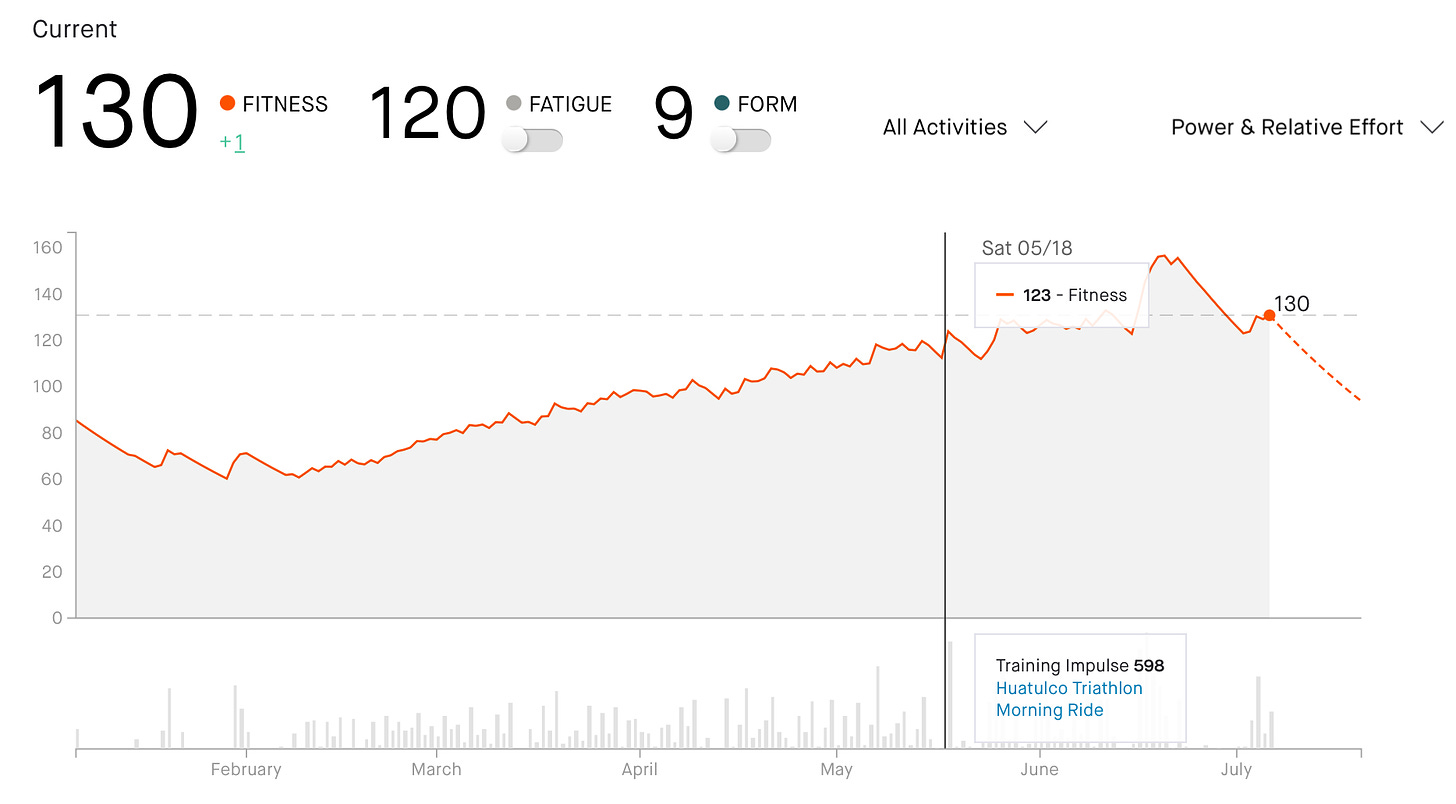Confessions of a reluctant fitness data nerd
Individual optimization or a shared sense of enchantment?
Dear Friends,
In a world where nearly everything is measurable, I've become a walking spreadsheet of personal metrics. But is knowing my cholesterol or V02 max to the decimal point making me healthier or just more anxious? What if the certainty of measurement is pulling me away from the necessary ambiguity of a meaningful life?
Here’s the guy I’d like to be:
But that is decidedly not me. I absolutely know my cholesterol, BMI, net worth, IQ, credit score, genetic ancestry, and — to appease the millennials — my astrological sign.
I know my average monthly spending, the time I’ve spent reading and listening to audiobooks, my genetic traits, my weekly word count, our investment performance, and even my cumulative carbon footprint based on every flight I’ve taken over the past 15 years.
Anyone who knows so much about themselves might be a narcissist. But I ask for a more generous interpretation: I’m genuinely interested in understanding myself better, my limitations, and how I can grow.
Including as an athlete.
The Allure of Self-Quantification
Here’s a quick story every triathlete can relate to. A few months ago I was sitting in a porta-potty on the beach, my stomach in turmoil. I had been training for the Huatulco triathlon for months. The race was about to start in ten minutes, and I felt like I might throw up the ceviche from the previous afternoon. I was too committed to not start the race. But would I be able to finish?
Surprisingly, I fared better than expected. Then I spent the next week sick in bed, unable to do anything but eat crackers and watch YouTube videos about becoming a faster triathlete. Before I had even fully recovered, I asked my buddy Nathan if he was up for a half-Ironman a few months later.
For a certain personality type, there is something addictive about measurable progress.
When Metrics Become an Obsession
So now I’m training for the Nayarit Half Ironman in November. I was already tracking all of the basic fitness metrics: resting heart rate, VO2 max, HRV, functional threshold power on the bike, and average speed and heart rate while running and swimming.1
Then I started to work with a coach — the highly recommended Roberto Flor — who convinced me to focus less on speed and more on efficiency. Now I have a new collection of metrics to obsess over. After each swim, I check my SWOLF score, stride rate, and distance per stride. During runs, I try to increase my cadence while lowering my vertical oscillation and ground contact time. And during bike rides, I’m optimizing my cadence to prevent fatigue during the race’s running segment.
Then there are things like weight, lean muscle mass, and intake of protein, carbs, and electrolytes.
It’s a lot to keep track of. And yet, each week I get a little bit better. I see it in the numbers. And it motivates me to keep training.
Reminding myself that I’m not a professional athlete
A quick interlude: July was the sports break I needed — first the Tour de France and then the Olympic Games. Some of my favorite moments were Kristen Faulkner’s gold medal in the women’s road race, the table tennis gold medal match between China and Sweden, and Alex Yee’s unforgettable triathlon finish.
It was also a reminder of the insane level of dedication and scientific optimization necessary for elite athletes to reach the top 0.01% of their sport. On top of winning the genetic lottery, you have to get it all right: the training, injury prevention, nutrition, and psychology.
Leading up to the Olympic Games, Jacob Goldstein released a series of podcast episodes exploring the latest technologies used by athletes and their coaches, including the use of MRI and AI to ensure optimal muscle development and motion capture video to make micro-adjustments that optimize an athlete’s form.
Similar technologies are available for everyday amateurs like me. My FORM smart goggles tell me if I’m lifting my head too far out of the water or losing efficiency in my stroke. Onform (and competitors) will analyze my swimming stroke, share the analysis with my coach, and recommend drills to improve my efficiency. And there are dozens of AI-based nutritionists to offer tailored recipes based on your workouts, dietary restrictions, and goals.
I'm not a professional athlete, but I could easily pretend to be one.
The many reasons to hate fitness data
There are many reasons to hate fitness data. They can feed a mentality that you're never good enough, no matter how much you improve. Someone out there will out-optimize you.
They distract you from the joy of sport. Structured workouts will make you faster, but sometimes (most of the time, in my case) you just want to go for a swim and let your mind wander without counting strokes or obsessing over your heart rate.
And honestly, who wants a screen of numbers displayed on their swimming goggles?
The very tools that push me to improve—my smart goggles, Apple Watch, and dashboard of meticulously recorded stats— also pull me away from the pure joy of movement and the shared experiences that make life meaningful.
Finding Balance in a Data-Driven World
So, I’m trying to find a happy medium. Yes, I want to occasionally use fitness data to get “harder, better, faster, stronger.”2 But then I want to stop paying attention to the data entirely and just cruise on instinct. I'm still figuring out what this looks like in practice. Maybe it's structured training for three months each year and then nine months of pure joy and instinct. Or maybe it’s three weeks of structured training every three months. I welcome your advice.
And it’s not just fitness data. I’d like to pay less attention to my finances too. As I wrote two years ago, the goal of financial literacy should be to think less about money, not more.
I know that I need to resist the seduction of individualistic optimization to experience more of what philosopher Charles Taylor describes as “the shared sense of enchantment in everyday experience.”
Once I stop training for this half-ironman in November, it will be a welcome relief to start planning for a shared sense of enchantment during our guided cycling camp in February.3
I want both things in my life. Yes, I want to excel individually. But more than anything, I want to bliss out in community.
Does this resonate? Have you managed to balance individual performance and community bliss? Hit me up.
Yours,
David
I’ve been reading up on “congregating.”








I'm not nearly as much of a fitness data nerd as you are, in fact I'm usually repulsed by this amount of data tracking and metric collection.. but there's something so meta and self-improvement-oriented about tracking personal insights that I appreciate. I respect anyone who can look inward and see their current state in life as an inflection point in a long journey of growth. With any other discipline, be it product design or accounting or construction, we need quantifiable metrics that improve the quality of things - ie: ux research, LEED ratings, etc.
But the other side of that coin is where people become too dissolved in the self-improvement game, where grwoth is the only positive metric, and contentment is gone to the wind. And you're right, this works for a certain personality type, where the obsession results in a constant 'not good enough' mentality supplemented with 75-hards, self-help books, and unrealistic standards. I can be that guy, at times. But most of the time, I'm good with the bliss that comes with ignorance.
*smh* own up that you are a data fitness nerd
as a former triathlon coach, looking at what you are doing now, I would suffer death by numbers/data, in the age of power meters, lactate testing, and heart rate zone, too few coach the art of honing your own perceived effort, I know you love the numbers and the science my friend